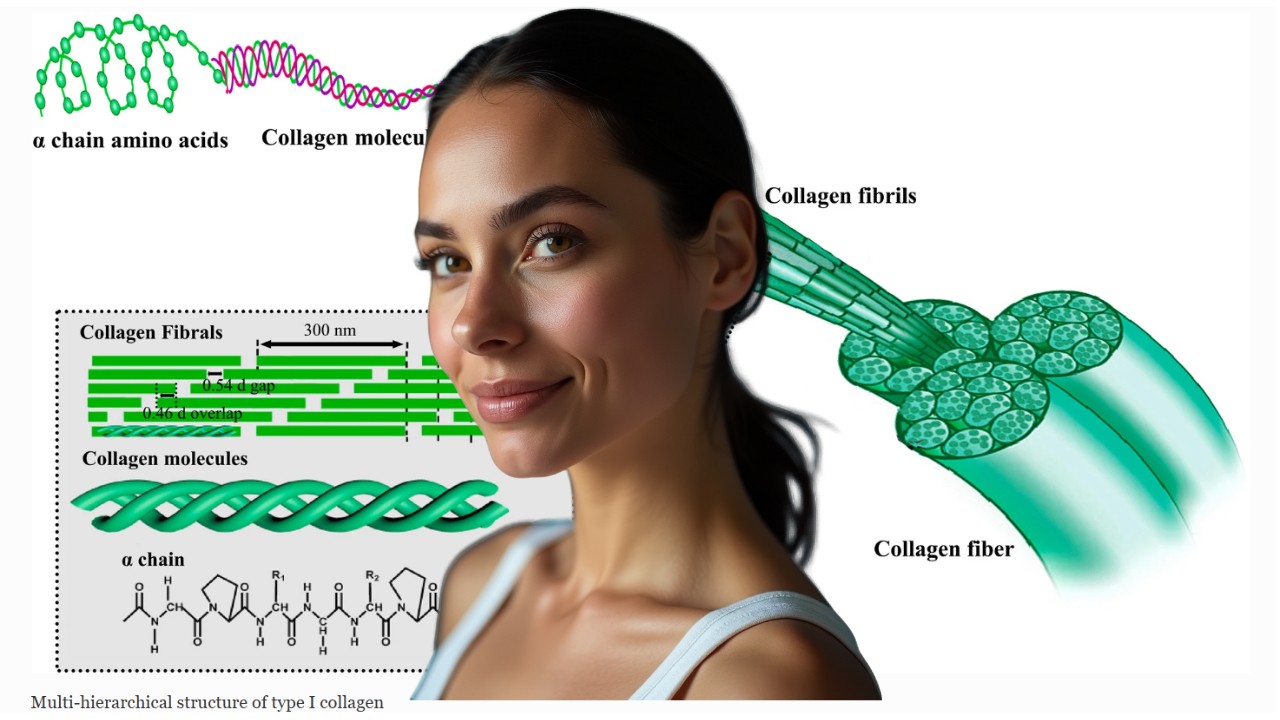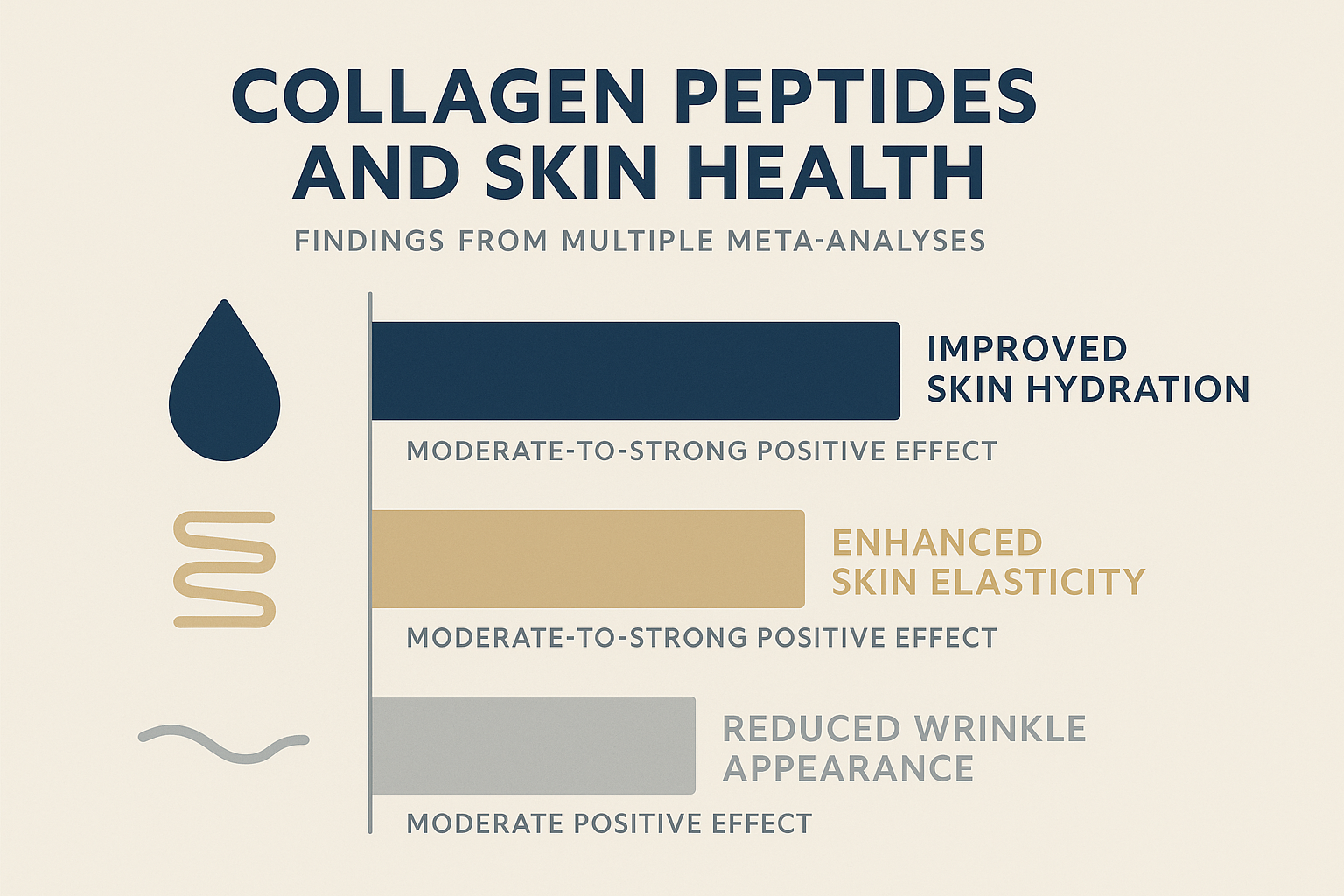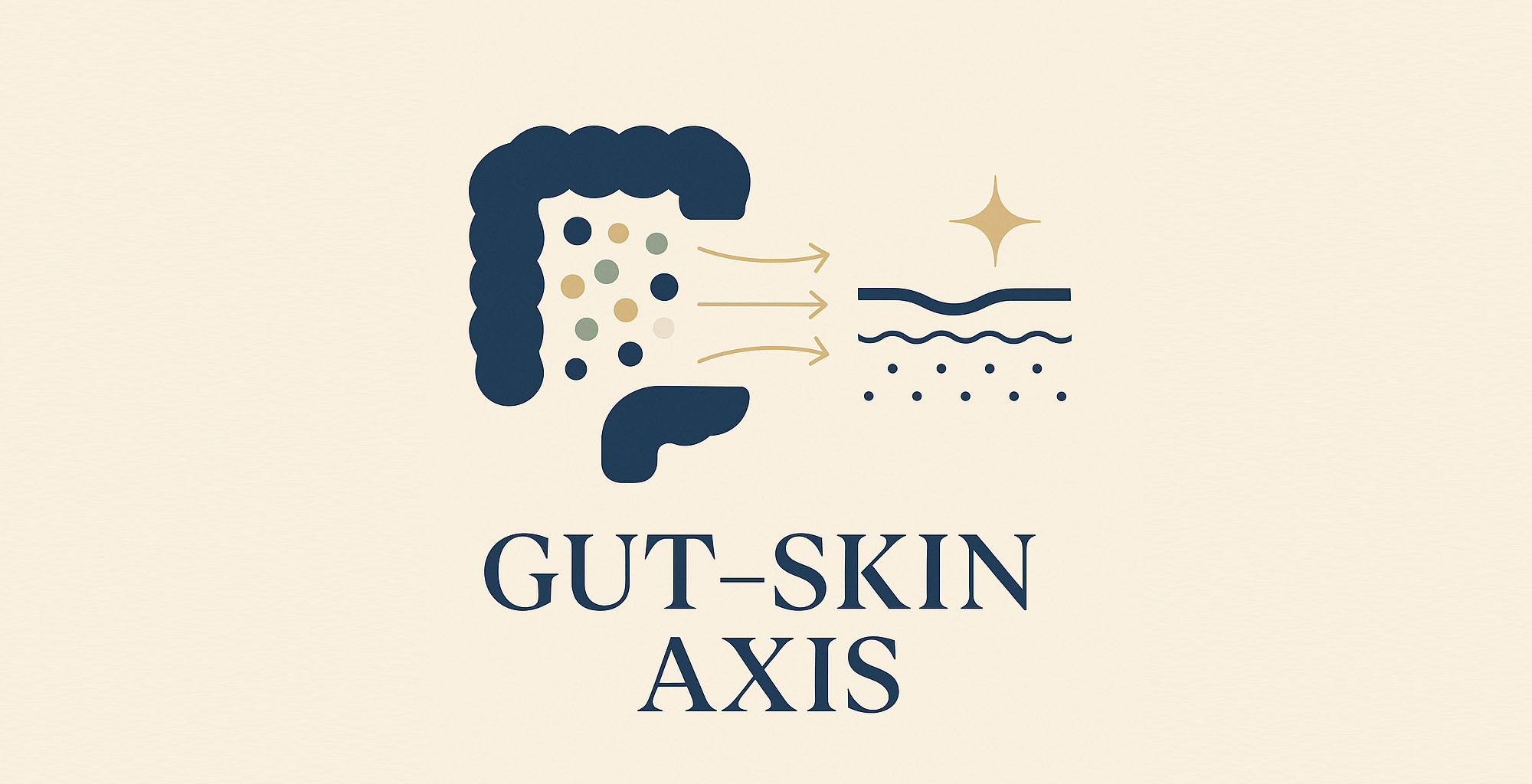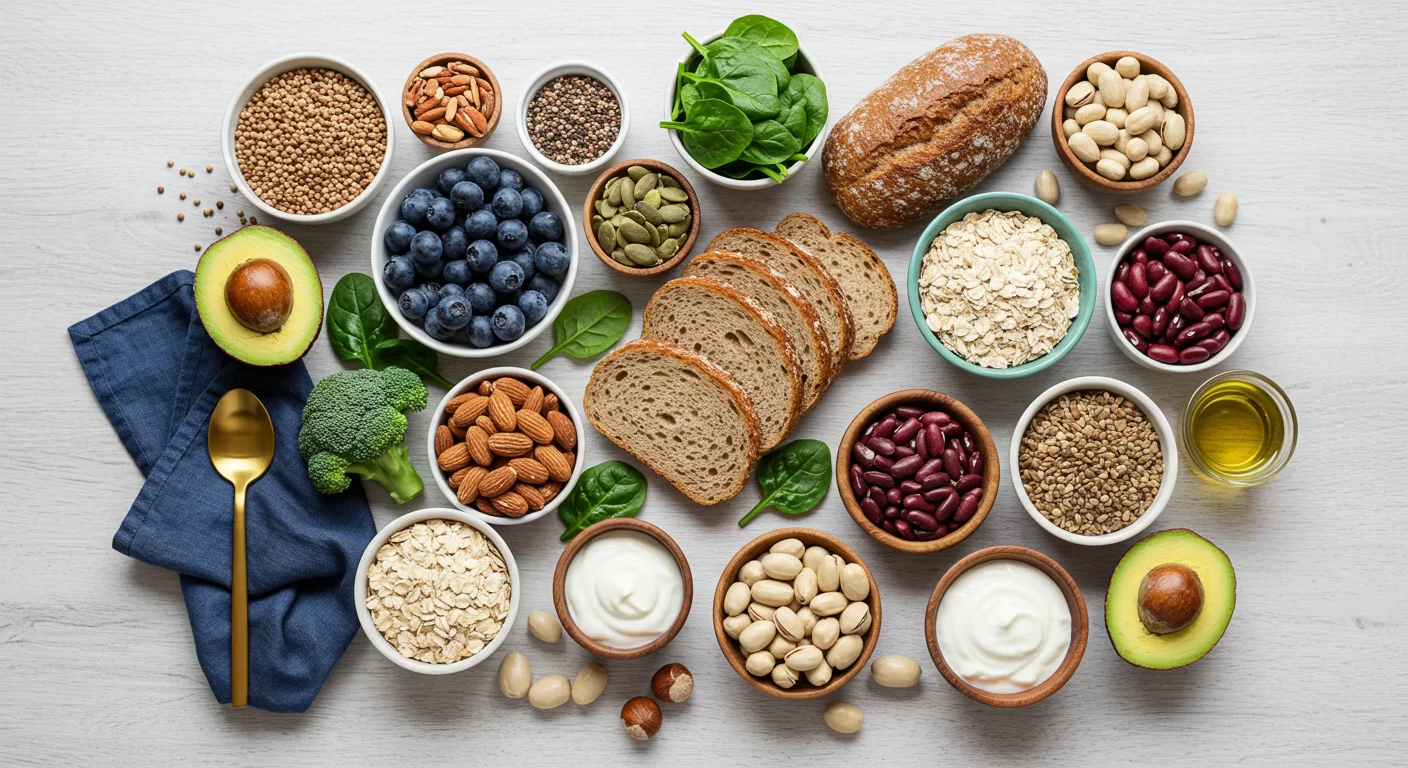In recent years, hydrolysed collagen supplements have gained widespread popularity among those seeking to support skin health, joint function, and overall well-being. Often referred to as collagen peptides, these supplements provide essential amino acids that contribute to maintaining a youthful appearance and strong connective tissues. But how exactly does hydrolysed collagen benefit the body, and why should it be a part of your daily routine?
This is a snapshot of some of the potential benefits of adding hydrolysed collagen to your diet. To learn more about the science behind the mechanism, the research done, and limitations of that research, make sure to read: Do Collagen Supplements Really Work: A Transparent Look at the Evidence.
Now let’s unpack the benefits!
Understanding Collagen and Its Importance
Collagen is the most abundant protein in the human body, forming the structural foundation of skin, hair, nails, bones, and connective tissues. It provides strength, elasticity, and hydration, keeping these tissues healthy. However, as we age, collagen production declines, leading to wrinkles, joint discomfort, and decreased skin firmness. Hydrolysed collagen supplements help replenish these lost stores, supporting the body’s natural structure and function.
The Role of Collagen in the Body
Collagen serves as a scaffold for tissues, promoting skin elasticity, joint mobility, and bone density. It is also vital for gut health, contributing to intestinal lining integrity. Research, PubMed, has demonstrated that collagen peptides may enhance skin hydration, reduce joint inflammation, and support digestive function
What is Hydrolysed Collagen?
Hydrolysed collagen (Bovine or Marine), or collagen peptides, is collagen broken down into smaller amino acid chains through enzymatic hydrolysis. This process increases its bioavailability, allowing for efficient absorption, upto 90%, and faster utilisation in the body.
Additionally, hydrolysis produces bioactive peptides, which are directly absorbed into the bloodstream and can exert biological effects, such as stimulating fibroblast activity for collagen synthesis, enhancing skin hydration, and supporting joint and bone regeneration.
If you want to learn more about Bioactive Peptides make sure you subscribe to be notified of our Bioactive Peptides literature release.
Collagen Skin Booster – Enhancing Skin Health
Collagen is a key component of skin structure, responsible for maintaining firmness, elasticity, and moisture retention. As collagen levels decline with age, fine lines, dryness, and sagging become more noticeable. Supplementing with hydrolysed collagen can help counteract these effects.
- Improves Skin Hydration: Collagen peptides enhance the skin’s moisture retention, reducing dryness and improving suppleness.
- Reduces Wrinkles & Fine Lines: Studies, PubMed, have shown that collagen supplementation increases skin elasticity, resulting in fewer visible wrinkles.
- Boosts Skin Repair: Collagen provides essential amino acids for cell regeneration, supporting wound healing and overall skin rejuvenation.
Collagen and Gut Health – Supporting Digestive Integrity
Collagen plays a crucial role in gut health by reinforcing the intestinal lining and supporting digestive function. Research suggests that collagen peptides help maintain gut integrity, which is particularly beneficial for those with digestive issues or increased intestinal permeability.
- Strengthens the Gut Barrier: Collagen is rich in glycine, glutamine, and proline, essential for maintaining intestinal wall integrity and supporting healthy digestion.
- May Reduce Gut Inflammation: Some studies suggest that collagen peptides help repair the intestinal lining and may support conditions like IBS and inflammatory bowel disease.
- Supports Beneficial Gut Bacteria: Emerging evidence suggests collagen peptides may indirectly benefit microbiome balance, creating a healthier gut environment.
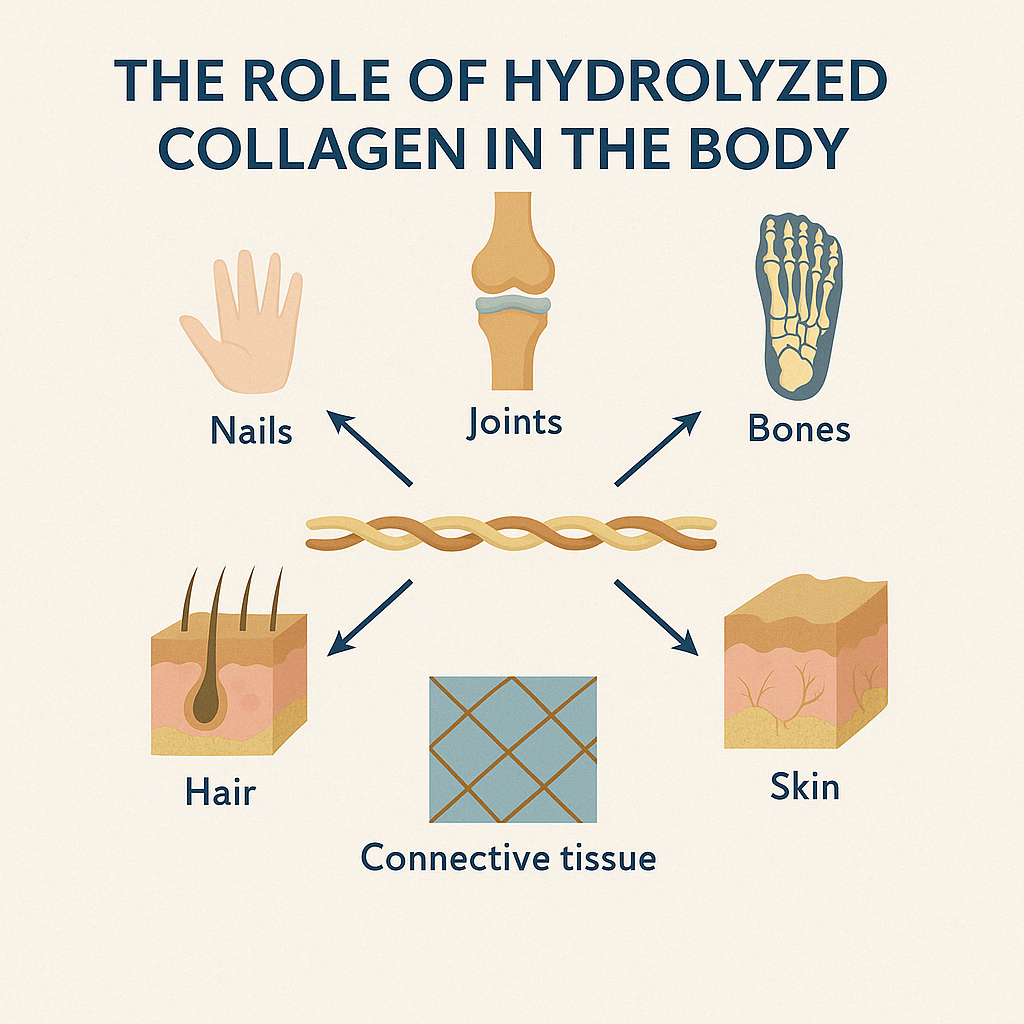
*Collagen peptides may contribute to a healthy gut environment, which can indirectly support beneficial bacteria and efficient short-chain fatty acid production. These benefits are part of a holistic approach to digestive wellness and are supported by emerging research
Supports Joint & Bone Health
Collagen is the main protein in cartilage, helping to cushion joints and prevent wear and tear.
- Reduces Joint Pain & Stiffness: Collagen supplementation has been shown to relieve osteoarthritis symptoms.
- Enhances Cartilage Regeneration: Provides amino acids essential for cartilage repair.
- Supports Bone Density: Regular collagen intake has been linked to improved bone mineral density, reducing osteoporosis risk.
Strengthens Hair & Nails
Hydrolysed collagen provides key amino acids that promote hair growth and nail strength.
- Reduces Hair Thinning: Collagen peptides supply proline, which supports keratin production.
- Prevents Nail Brittleness: Studies indicate that regular intake of collagen improves nail strength and durability.
Collagen for Menopause – Maintaining Skin & Bone Health
During menopause, oestrogen levels drop, accelerating collagen loss. This leads to thinner skin, reduced bone density, and joint stiffness. Collagen supplementation can help counteract these effects:
- Supports Skin Firmness: Hydrolysed collagen boosts elasticity, slowing down menopausal skin ageing.
- Aids in Bone Strength: Collagen peptides assist in maintaining bone mass, reducing fracture risk.
- May Improve Joint Flexibility: Provides amino acids essential for joint lubrication.
Scientific research supports collagen supplementation for postmenopausal women, indicating improvements in skin hydration, bone density, and joint comfort.
You can read more about the role of collagen and other key supplements in managing Menopause Joint pain in our dedicated article.
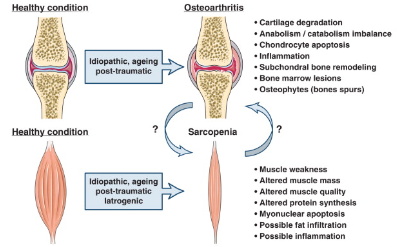
Is Bovine or Marine Collagen Better?
Bovine collagen is rich in Type I and Type III collagen, both essential for skin, joint, and gut health. Type I collagen, which makes up 90% of the body’s collagen, is key for skin elasticity and hydration, helping to reduce wrinkles and maintain firmness. Type III collagen, often found alongside Type I, plays a crucial role in tissue repair, blood vessel formation, and skin resilience, promoting a youthful, plump appearance.
While marine collagen is also a potent source of Type I collagen and has been shown to enhance skin hydration and elasticity, it contains little to no Type III collagen. As a result, bovine collagen offers a broader spectrum of benefits, particularly for those looking to support not just skin, but also joint and gut health. If you want to learn more about Marine vs Bovine Collagen, read our dedicated guide here.
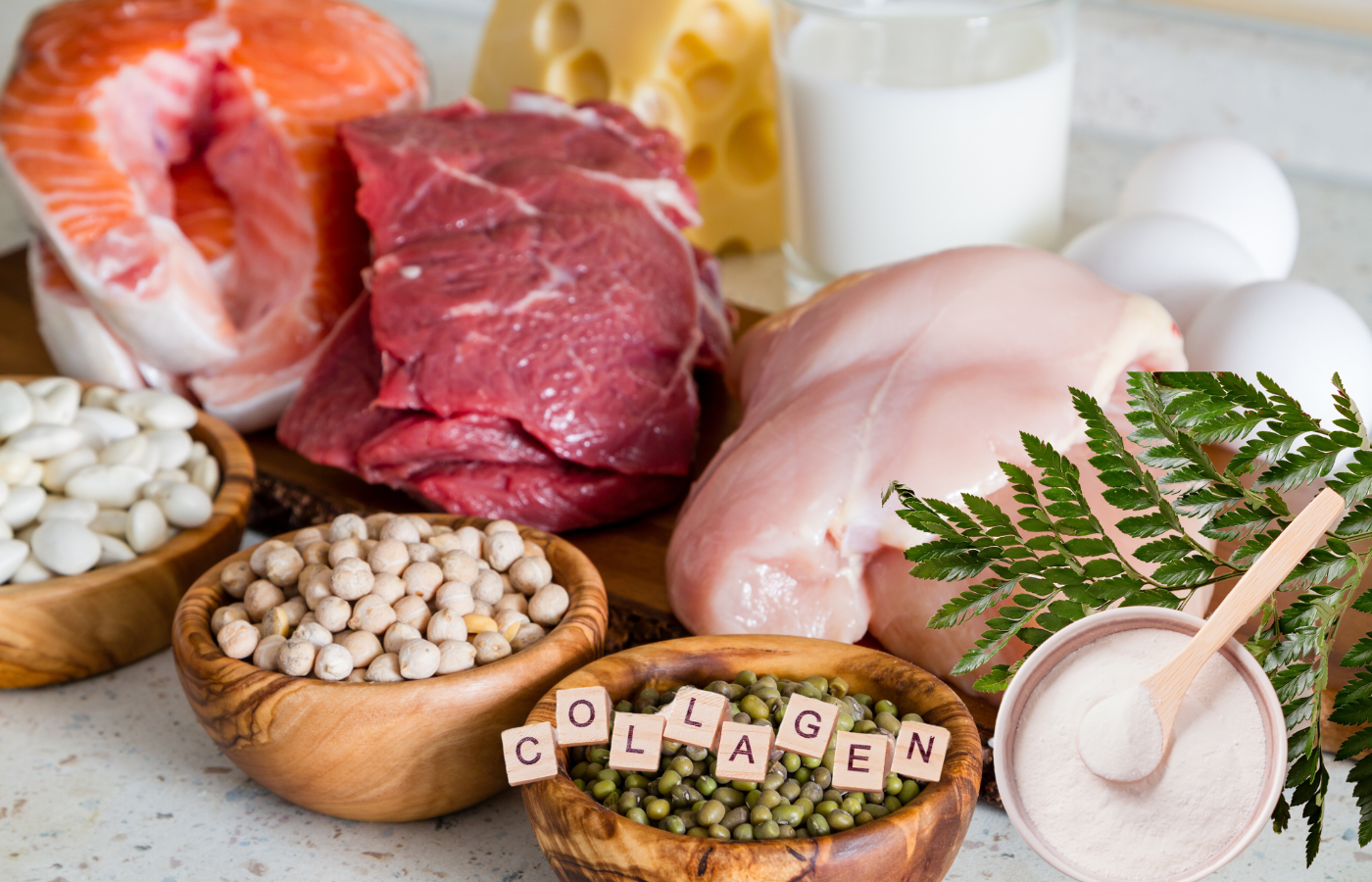
What are the main takeaways about hydrolysed collagen benefits?
Hydrolysed collagen supplements offer a range of science-backed benefits, from improving skin elasticity and supporting joint function to enhancing gut and bone health. Additionally, for menopausal women, collagen can help mitigate age-related collagen decline. Incorporating a collagen skin booster alongside a balanced diet can help maintain radiant skin, strong joints, and overall well-being.
By integrating collagen peptides into your wellness routine, you can take a comprehensive approach to healthy ageing and longevity. To learn more about the timeline check our article “How Long it Takes for Collagen Supplements to Work”.
FAQs
Collagen is the large, fibrous protein found naturally in the body. Hydrolysed collagen, also known as collagen peptides, is the result of breaking down this larger collagen protein into smaller chains of amino acids through a process called enzymatic hydrolysis. This process significantly increases its bioavailability, allowing for easier and more efficient absorption by the body compared to intact collagen.
Yes, hydrolysed collagen is significantly better absorbed by the body than intact collagen. The enzymatic hydrolysis process breaks down the large collagen molecules into smaller peptides, which can pass more easily through the intestinal lining and into the bloodstream. Your article mentions absorption rates of up to 90% for hydrolysed collagen.
Yes, hydrolysed collagen can support healthy hair growth. It provides essential amino acids, including proline, which is a key component of keratin, the main protein in hair. By supplying these building blocks, hydrolysed collagen can help reduce hair thinning and promote stronger, healthier hair.
Yes, hydrolysed collagen can support healthy hair growth. It provides essential amino acids, including proline, which is a key component of keratin, the main protein in hair. By supplying these building blocks, hydrolysed collagen can help reduce hair thinning and promote stronger, healthier hair.
The timeframe for noticeable benefits can vary. Some individuals may experience improvements in skin hydration within a few weeks, while other benefits like reduced joint pain or improved hair and nail strength may take several months of consistent supplementation. Patience and regular intake are key. To learn more about the timeline check our article "How Long it Takes for Collagen Supplements to Work".
Join Us in Redefining Beauty
Subscribe for Exclusive Insights

